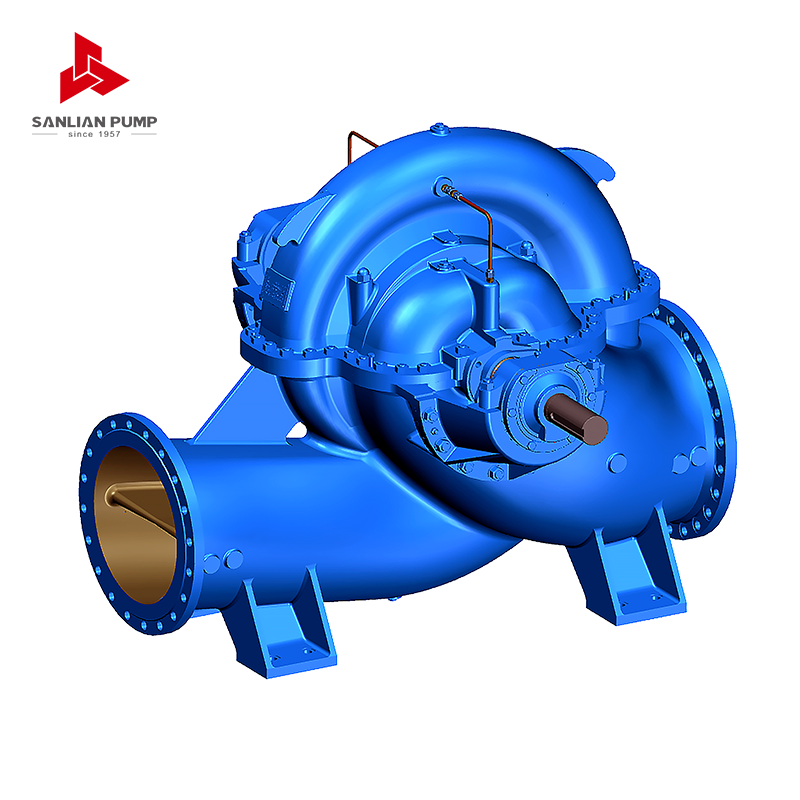Sanlian Pump Industry Group is a manufacturing enterprise based on water supply and drainage equipment. The group company integrates R&D, design, casting, production and sales, and provides customers with modern, digital and intelligent comprehensive solutions for fluid transportation and integrated systems.
What should be considered when selecting a Split Case Pump for a municipal water supply system?
When choosing a Split Case Pump for an urban water supply system, multiple aspects need to be considered to ensure the efficiency, reliability and economy of the system. The following are the main considerations:
1. Delivery flow and head requirements
The core requirement of an urban water supply system is to meet the water demand during daily and peak hours, so the required flow and head must be accurately calculated based on the scale of water supply, the population served and the terrain conditions. Split Case Pumps are suitable for large flow and medium head conditions and are usually used in main water supply pipelines or large water transfer hubs.
2. Energy efficiency ratio and operating cost
The efficiency of the pump directly affects the energy consumption level. A high-efficiency Split Case Pump can significantly reduce electricity costs in long-term operation, so products with high-efficiency curves should be preferred, and their performance at multiple operating points should be paid attention to, not just the rated point.
3. Pump structure and maintenance convenience
The Split Case Pump is easy to maintain and repair due to its horizontally split shaft structure design, without disassembling the pipeline or motor. This structure is particularly critical for the continuous operation and rapid repair of urban water supply systems, especially in emergencies or sudden incidents.

4. Material selection and corrosion resistance
The water supply system transports clean water, and usually requires the pump body and flow-through parts to have good corrosion resistance and hygienic safety. It is necessary to select suitable materials according to the water quality characteristics, such as cast iron, stainless steel or alloy materials with anti-corrosion coating to extend the life of the equipment.
5. Stability and noise and vibration control
Urban water supply systems are often located in residential areas or underground in cities, and have high requirements for noise and vibration. Split Case Pump has stable operation and low vibration, which is one of its important advantages, but it still needs to be comprehensively optimized in combination with the basic design of the pump group, couplings, shock absorbers, etc.
6. Adapt to system operation mode
Urban water supply has the characteristics of large day and night load changes and strong seasonal fluctuations. It is necessary to consider the variable frequency operation capability, adjustment performance and linkage with other pump groups of the pump group to ensure that the system can stably supply water under various operating conditions.
7. Brand and service capabilities
Since the water supply system has extremely high reliability requirements, it is recommended to select a manufacturer with mature technology and a complete after-sales service system. Good technical support, spare parts supply and response speed play an important role in ensuring the long-term operation of the system.
8. Cost and life cycle evaluation
In addition to the initial purchase cost, the operating expenses, maintenance costs and potential replacement cycles of the pump throughout its life cycle should also be evaluated to conduct a comprehensive cost-effectiveness analysis to avoid focusing only on one-time investment and ignoring the subsequent operating burden.
Taking the above factors into consideration, the engineering design unit usually needs to perform detailed calculations based on specific project parameters during the selection process, and work closely with the equipment manufacturer to conduct professional hydraulic model matching and system integration design to ensure the efficient, safe and sustainable operation of the water supply system.








 English
English 中文简体
中文简体 Français
Français Español
Español Português
Português عربى
عربى




 皖公网安备34052302341647号
皖公网安备34052302341647号